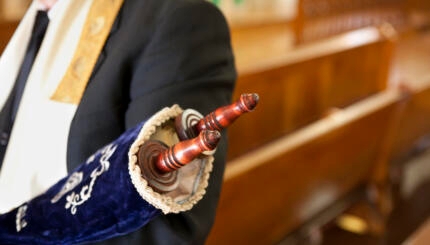While Jewish parlance often seems to divide the world into two groups–Jews and non-Jews–in Jewish tradition, not all gentiles are viewed in the same light.
Legal Issues
The Ten Commandments begins with the affirmation of the existence of the God of Israel and the prohibition against idolatry. The case against idolatry is made repeatedly in the Bible, and the rabbis of the Talmud drafted many additional laws to distance Jews from idolatry and idolaters. The Torah also relays a general law against following hukkot ha-goy, the practices of the gentiles, though Jewish legal authorities have interpreted this in a variety of ways.
The Talmud, particularly Tractate Avodah Zarah (Idolatry), discusses laws that govern interactions between Jews and non-Jews. Non-Jews are often not entitled to the same rights as Jews, reflecting a suspicion that gentiles would not reciprocate Israelite good will.
This was not the case with a non-idolatrous gentile–known as a ger toshav or resident alien. A ger toshav was a non-Jew who lived in the Land of Israel and abided by the seven universal laws, the Noahide commandments. Such a person was considered a member of Israelite society and received the benefits of Israelite charities and social services.
Jewish Chosenness
A number of biblical verses assert that God designated the Jews for a unique relationship.
 Traditionally, there have been two different ways to understand the nature of Jewish chosenness. According to one view, the relationship between God and the Jews was established by the covenant at Sinai and is dependent upon Jewish obedience; thus Jews are not fundamentally superior to other people. According to the second view, Jewish people have unique, inherent qualities that make them chosen. This position doesn’t necessarily posit Jewish supremacy, but it does suggest that Jews as a people have certain advantageous characteristics, which other people lack.
Traditionally, there have been two different ways to understand the nature of Jewish chosenness. According to one view, the relationship between God and the Jews was established by the covenant at Sinai and is dependent upon Jewish obedience; thus Jews are not fundamentally superior to other people. According to the second view, Jewish people have unique, inherent qualities that make them chosen. This position doesn’t necessarily posit Jewish supremacy, but it does suggest that Jews as a people have certain advantageous characteristics, which other people lack.
Some modern Jewish thinkers have reinterpreted chosenness to temper its perceived vision of Jewish superiority, while others–such as Mordecai Kaplan, the father of Reconstructionist Judaism–have rejected the doctrine outright.
Attitudes Toward Non-Jews
The biblical and rabbinic attitudes toward non-Jews reflect the presumption that non-Jews are idolaters, and that idolatry is associated with moral deviance. Nonetheless, this general attitude wasn’t directed at individual gentiles. According to the authoritative talmudic position, a righteous gentile has a share in the World to Come.
In the Middle Ages, Jewish authorities debated whether Christianity and Islam were considered idolatrous, and this affected their views of these religions. Some authorities accepted that Christianity and Islam had some value, while others considered them repugnant and false. The end of the twentieth century saw a flurry of Jewish-Christian dialogue, with many liberal theologians–both Jews and Christians–gravitating toward more accepting positions. Similar Jewish-Muslim dialogue has yet to occur.
Until recently, there was very little contact between Jews and Eastern religions such as Buddhism and Hinduism. Though many aspects of these religions are reminiscent (in the eyes of traditionalists) of ancient Near Eastern idolatry, some contemporary Jews have developed an affinity for them, and members of the Jewish Renewal movement have incorporated a number of Eastern practices–e.g. Zen meditation–into their prayers and practices.
Torah
Pronunced: TORE-uh, Origin: Hebrew, the Five Books of Moses.


